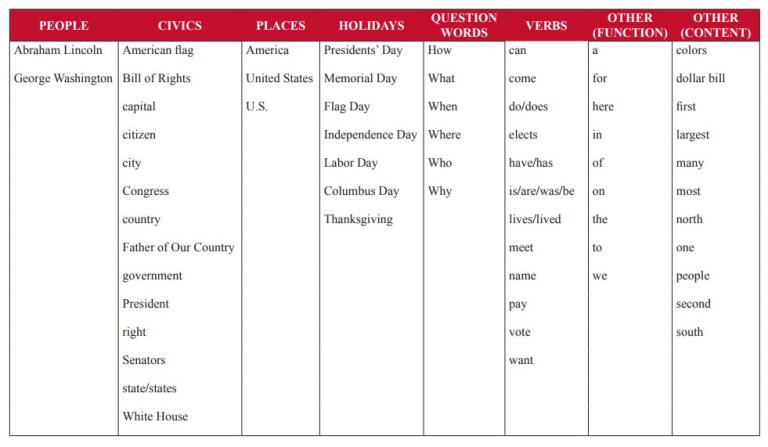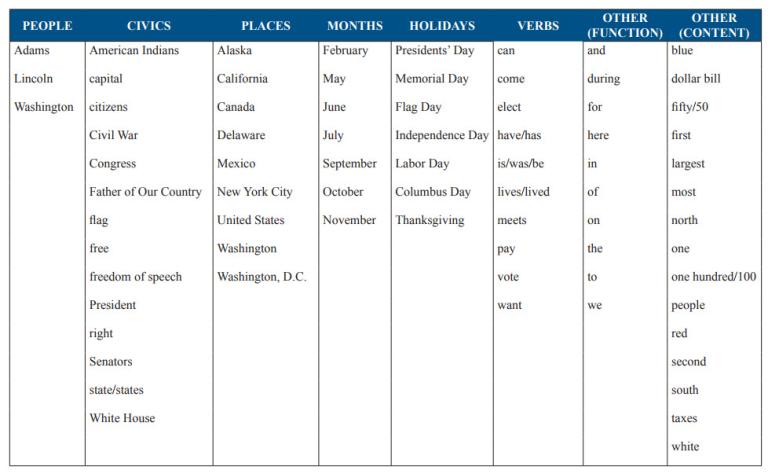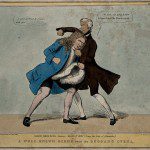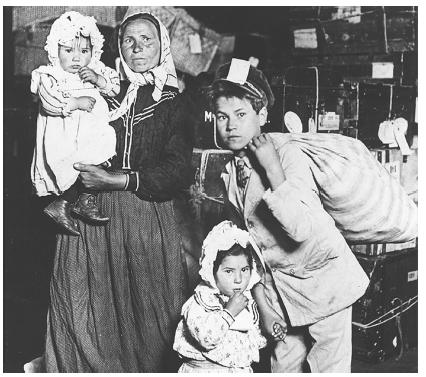![https://commons.wikimedia.org/wiki/File%3ANaturalization_Ceremony_Grand_Canyon_20100923mq_0555_(5021872334).jpg; By Grand Canyon National Park [CC BY 2.0 (http://creativecommons.org/licenses/by/2.0) or Public domain], via Wikimedia Commons](https://wp-media.patheos.com/blogs/sites/533/2017/11/Naturalization_Ceremony_Grand_Canyon_20100923mq_0555_5021872334.jpg)
Regular readers will know that my husband is German. As it happens, he’s in the process of applying for citizenship, and brought home a prep booklet for the citizenship test after a preliminary appointment today.
You know those inspirational stories one reads occasionally about individuals working hard to pass the citizenship exam, and the cynical comments that a typical American couldn’t pass the citizenship exam because it’s so hard? Here’s fun fact: there are 100 potential questions on the citizenship test — everything from “who was the first president?” to “how many U.S. Representatives are there?” to “what do we celebrate on the 4th of July?” The full list is here. But in the actual test, you are asked 10 random questions from this list, and you must answer 6 of them correctly. That’s a pretty low standard. (Incidentally, if you’re over 65, you’re asked questions from a subset of only 20 of the easier questions.)
What’s more, the test is given orally; the examiner just asks you the questions, alongside other questions about your eligibility. This isn’t like the DMV, where you go from one station to the next, then stop to take a scantron test. Which means that, on the one hand, the test is not multiple choice, but on the other hand, the test says nothing about your ability to read and write.
Of course, you might say, there is a separate English part of the test that ensures that we only award naturalization to people who have learned English. And that’s true — sort of. Unless you are over age 50, with 20 years of permanent residence, or over age 55, with 15 years of permanent residence, you must take an English test. Over this age, and you may bring an interpreter with you.
But what does this test consist of? Fundamentally, your ability to understand spoken English. The examiner will ask a few small talk-type questions before beginning the interview (e.g., “how was your trip in?”), then may give you some instruction such as “put your purse on the middle chair,” before asking for identification, asking questions from the application, and then asking the citizenship test questions. If you cannot demonstrate the basic command of spoken English necessary to manage these exchanges, you will fail the test.
(This is similar to the test I didn’t know I was receiving, when my husband and I had our appointment for me to get my work visa in Germany, going on 13 years ago; after the initial conversation primarily with my husband about certain technical details, she turned to me and asked me questions about living in Germany and what I would be up to. Only afterwards did I understand that the visa in my passport wouldn’t have been forthcoming if I had been mute, or, at any rate, I would have been given a conditional visa and been sent off to German lessons. To be honest, though, I think my informal test was harder than what the citizenship interview youtube videos demonstrate.)
https://www.youtube.com/watch?v=1uuKgawzlNI&t=732s
What about reading and writing English? Folks, you will be shocked at how minimal a literacy level is required.
The reading test consists of three sentences, one of which the individual must be able to read. The writing test consists of a one-sentence dictation. And the vocabulary for these tests?
Here’s the word list for the reading test:

and here’s the list from the writing test:

These words are combined together to produce sentences such as “The president lives in the White House” or “Washington is on the dollar bill.”
Is memorizing a short reading list a demonstration of one’s ability to read? Hardly.
Not long ago, a story surfaced about a woman who passed the citizenship exam and became a citizen despite not knowing English and not being able to read or write in any language. Because she had lived in the U.S. for over 20 years and was over 50 years old, she was exempt from any English-speaking requirement, and took the test in Spanish. Her determination to memorize all of the citizenship questions was framed as inspirational. Honestly, I’d find it much more inspiring if she had, at some point in those 20 years, learned to speak English and learned to read and write — or if her mentor had cared to teach her those skills rather than rote memorization of civics questions.
But she’s not the only one. Because the literacy test is so minimal, a recent study determined that a third of all naturalized citizens are functionally illiterate.
This falls in the category of Not OK. ‘Kay?
https://commons.wikimedia.org/wiki/File%3ANaturalization_Ceremony_Grand_Canyon_20100923mq_0555_(5021872334).jpg; By Grand Canyon National Park [CC BY 2.0 (http://creativecommons.org/licenses/by/2.0) or Public domain], via Wikimedia Commons













